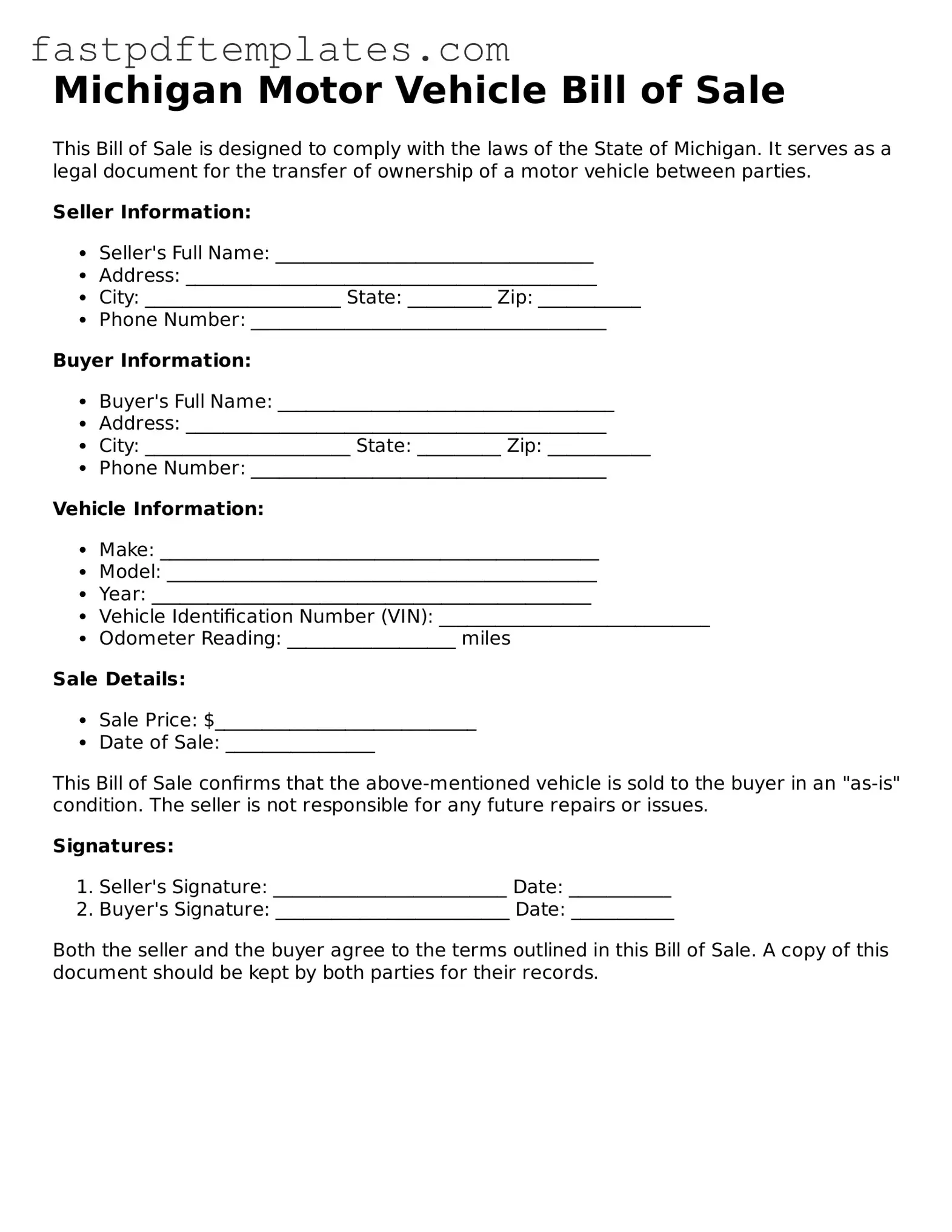The Michigan Motor Vehicle Bill of Sale is similar to a general Bill of Sale used for various types of personal property transactions. Both documents serve as proof of a sale, providing essential details about the buyer, seller, and the item being sold. They establish ownership transfer and can be used in disputes or for registration purposes. The general Bill of Sale is versatile, applying to items like furniture, electronics, and other goods, while the Motor Vehicle Bill of Sale is specific to vehicles.
A Vehicle Title is another document closely related to the Motor Vehicle Bill of Sale. The title serves as official proof of vehicle ownership and includes details like the Vehicle Identification Number (VIN) and the owner's name. When a vehicle is sold, the title must be transferred from the seller to the buyer. The Bill of Sale complements the title by providing a record of the transaction, ensuring both parties have a clear understanding of the sale's terms.
The Purchase Agreement for a vehicle also bears similarity to the Motor Vehicle Bill of Sale. This document outlines the terms of the sale, including the price, payment method, and any conditions that must be met. While the Bill of Sale confirms the transaction's completion, the Purchase Agreement serves as a blueprint for the sale process. Both documents protect the interests of the buyer and seller and help prevent misunderstandings.
A Warranty Deed, though primarily used for real estate transactions, is similar in that it also transfers ownership. Like the Motor Vehicle Bill of Sale, it provides a written record of the transfer and includes details about the parties involved. Both documents are essential for legal recognition of ownership and can be used in disputes to establish rights over the property or vehicle.
The Affidavit of Ownership is another document related to the Motor Vehicle Bill of Sale. This affidavit can be used when the seller cannot provide a title or proof of ownership. It affirms the seller's claim to the vehicle and is often required by the state for registration purposes. Like the Bill of Sale, it serves to protect the interests of the buyer by confirming the seller's right to sell the vehicle.
A Power of Attorney can be compared to the Motor Vehicle Bill of Sale in terms of authority transfer. While the Bill of Sale transfers ownership of a vehicle, a Power of Attorney allows one person to act on behalf of another in legal matters, including vehicle transactions. Both documents require clear identification of the parties and the item involved, ensuring that the transaction is legally binding.
The Odometer Disclosure Statement is similar to the Motor Vehicle Bill of Sale as it is often included in the sale of a vehicle. This document records the vehicle's mileage at the time of sale, helping to prevent fraud related to odometer tampering. Both documents are essential for ensuring transparency in the sale process and protecting the buyer from potential misrepresentation.
The Certificate of Title Application can also be likened to the Motor Vehicle Bill of Sale. When a vehicle is purchased, the new owner must apply for a title in their name. This application often requires a copy of the Bill of Sale to prove the transaction took place. Both documents are crucial for establishing legal ownership and facilitating the registration process with the state.
Finally, a Salvage Title is similar in that it represents a specific status of a vehicle, often after it has been declared a total loss by an insurance company. When a vehicle with a salvage title is sold, a Bill of Sale is typically required to document the transaction. Both documents serve to protect the buyer by providing a clear record of the vehicle's history and ownership status.

